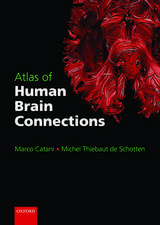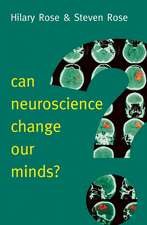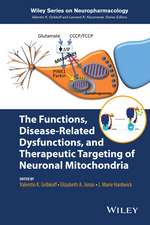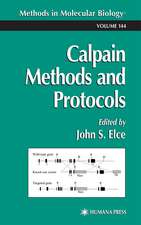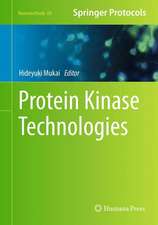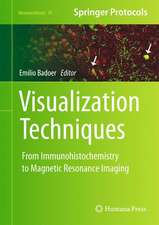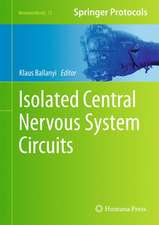Stroke Genomics: Methods and Reviews: Methods in Molecular Medicine, cartea 104
Editat de Simon J. Read, David Virleyen Limba Engleză Hardback – 21 sep 2004
| Toate formatele și edițiile | Preț | Express |
|---|---|---|
| Paperback (1) | 642.83 lei 6-8 săpt. | |
| Humana Press Inc. – 10 noi 2010 | 642.83 lei 6-8 săpt. | |
| Hardback (1) | 650.55 lei 6-8 săpt. | |
| Humana Press Inc. – 21 sep 2004 | 650.55 lei 6-8 săpt. |
Din seria Methods in Molecular Medicine
- 5%
 Preț: 1278.74 lei
Preț: 1278.74 lei - 15%
 Preț: 655.78 lei
Preț: 655.78 lei - 5%
 Preț: 1106.50 lei
Preț: 1106.50 lei - 5%
 Preț: 727.44 lei
Preț: 727.44 lei - 5%
 Preț: 1108.72 lei
Preț: 1108.72 lei - 5%
 Preț: 735.66 lei
Preț: 735.66 lei - 18%
 Preț: 947.35 lei
Preț: 947.35 lei - 18%
 Preț: 948.92 lei
Preț: 948.92 lei - 5%
 Preț: 1114.54 lei
Preț: 1114.54 lei - 5%
 Preț: 1114.91 lei
Preț: 1114.91 lei - 15%
 Preț: 658.55 lei
Preț: 658.55 lei - 5%
 Preț: 734.01 lei
Preț: 734.01 lei - 5%
 Preț: 1111.61 lei
Preț: 1111.61 lei - 5%
 Preț: 1104.32 lei
Preț: 1104.32 lei - 5%
 Preț: 723.21 lei
Preț: 723.21 lei - 5%
 Preț: 1106.13 lei
Preț: 1106.13 lei - 5%
 Preț: 723.05 lei
Preț: 723.05 lei - 5%
 Preț: 1108.35 lei
Preț: 1108.35 lei - 5%
 Preț: 723.42 lei
Preț: 723.42 lei - 5%
 Preț: 1115.65 lei
Preț: 1115.65 lei - 5%
 Preț: 786.86 lei
Preț: 786.86 lei - 5%
 Preț: 1133.01 lei
Preț: 1133.01 lei - 5%
 Preț: 1114.71 lei
Preț: 1114.71 lei
Preț: 650.55 lei
Preț vechi: 765.36 lei
-15% Nou
Puncte Express: 976
Preț estimativ în valută:
124.48€ • 129.97$ • 103.02£
124.48€ • 129.97$ • 103.02£
Carte tipărită la comandă
Livrare economică 05-19 aprilie
Preluare comenzi: 021 569.72.76
Specificații
ISBN-13: 9781588293336
ISBN-10: 1588293335
Pagini: 351
Ilustrații: X, 351 p. 65 illus.
Dimensiuni: 155 x 235 x 30 mm
Greutate: 0.7 kg
Ediția:2005
Editura: Humana Press Inc.
Colecția Humana
Seria Methods in Molecular Medicine
Locul publicării:Totowa, NJ, United States
ISBN-10: 1588293335
Pagini: 351
Ilustrații: X, 351 p. 65 illus.
Dimensiuni: 155 x 235 x 30 mm
Greutate: 0.7 kg
Ediția:2005
Editura: Humana Press Inc.
Colecția Humana
Seria Methods in Molecular Medicine
Locul publicării:Totowa, NJ, United States
Public țintă
ResearchCuprins
to Stroke Genomics.- Preclinical Models and Gene Manipulation.- Choice, Methodology, and Characterization of Focal Ischemic Stroke Models.- Mutant Animal Models of Stroke and Gene Expression.- Gene Therapy in Neurological Disease.- Stem Cell Transplantation After Middle Cerebral Artery Occlusion.- Endogenous Brain Protection.- Production of Transgenic and Mutant Mouse Models.- 3-Nitropropionic Acid Model of Metabolic Stress.- Clinical Paradigms.- Practicalities of Genetic Studies in Human Stroke.- Evaluation of the Interactions of Common Genetic Mutations in Stroke.- Assessing Differential Expression.- Technologies of Disease-Related Gene Discovery Using Preclinical Models of Stroke.- Quantitative Analysis of Gene Transcription in Stroke Models Using Real-Time RT-PCR.- Effective Analysis of Genomic Data.- Bioinformatic Approaches to Assigning Protein Function From Novel Sequence Data.- Pragmatic Target Discovery From Novel Gene to Functionally Defined Drug Target.
Recenzii
From the reviews:
"The protocols presented in Stroke Genomics: Methods and Reviews will greatly benefit scientists interested in the molecular biology as well as the genetic and genomic basis of strokes." - Journal of Chemical Neuroanatomy
"...very interesting and informative...an attractive and interesting overview of the different aspects of the current stroke research...can be recommended as a source of useful and up-to-date practical and theoretical information on stroke genetics and on stroke associated gene expression." - European Neurology
"This book gives the opportunity for experts in the field to explore the practical and experimental applications of genomic and molecular biology research to the treatment of stroke. … The book also indicates detailed methods for studying the molecular biology of stroke. … It can be recommended if one is interested in the basic scientific background that underlies central nervous system pathology … ." (J. V. Byrne, Neuroradiology, Vol. 47, 2005)
"The protocols presented in Stroke Genomics: Methods and Reviews will greatly benefit scientists interested in the molecular biology as well as the genetic and genomic basis of strokes." - Journal of Chemical Neuroanatomy
"...very interesting and informative...an attractive and interesting overview of the different aspects of the current stroke research...can be recommended as a source of useful and up-to-date practical and theoretical information on stroke genetics and on stroke associated gene expression." - European Neurology
"This book gives the opportunity for experts in the field to explore the practical and experimental applications of genomic and molecular biology research to the treatment of stroke. … The book also indicates detailed methods for studying the molecular biology of stroke. … It can be recommended if one is interested in the basic scientific background that underlies central nervous system pathology … ." (J. V. Byrne, Neuroradiology, Vol. 47, 2005)
Textul de pe ultima copertă
Although numerous genomic studies of stroke have examined such factors as stroke inheritance, chromosomal loci of risk, preclinical models of stroke, and differential gene expression of brain injury, repair, and recovery, much work to determine the precise role of gene function in human neurological pathophysiology remains ahead. In Stroke Genomics: Methods and Reviews, leading experts in the field explore the pragmatic application of the tools of genomic and molecular biology research to the treatment of stroke. Providing the reader with cutting-edge reviews of clinical and preclinical genomics, the authors relate changes in gene expression to physiological end points-such as functional imaging paradigms-to produce a more holistic approach in which molecular biology goes hand in hand with stroke pathophysiology. Topics of special interest include stem cell transplantation, gene therapy, clinical gene/gene interaction studies, and cytokine drug discovery. Readily reproducible techniques are provided, along with ancillary methods (imaging, animal models, human genetic study design, and transgenic animal production) that can be effectively applied to gene discovery. The protocols follow the successful Methods in Molecular Biology™ series format, each offering step-by-step laboratory instructions, an introduction outlining the principle behind the technique, lists of the necessary equipment and reagents, and tips on troubleshooting and avoiding known pitfalls.
Cutting-edge and highly practical, Stroke Genomics: Methods and Reviews shows how to successfully design, execute, and interpret preclinical and clinical molecular biological studies of stroke, work that will greatly advance its understanding, as well as rapid development of the next generation of stroke therapeutics.
Cutting-edge and highly practical, Stroke Genomics: Methods and Reviews shows how to successfully design, execute, and interpret preclinical and clinical molecular biological studies of stroke, work that will greatly advance its understanding, as well as rapid development of the next generation of stroke therapeutics.
Caracteristici
Includes supplementary material: sn.pub/extras





